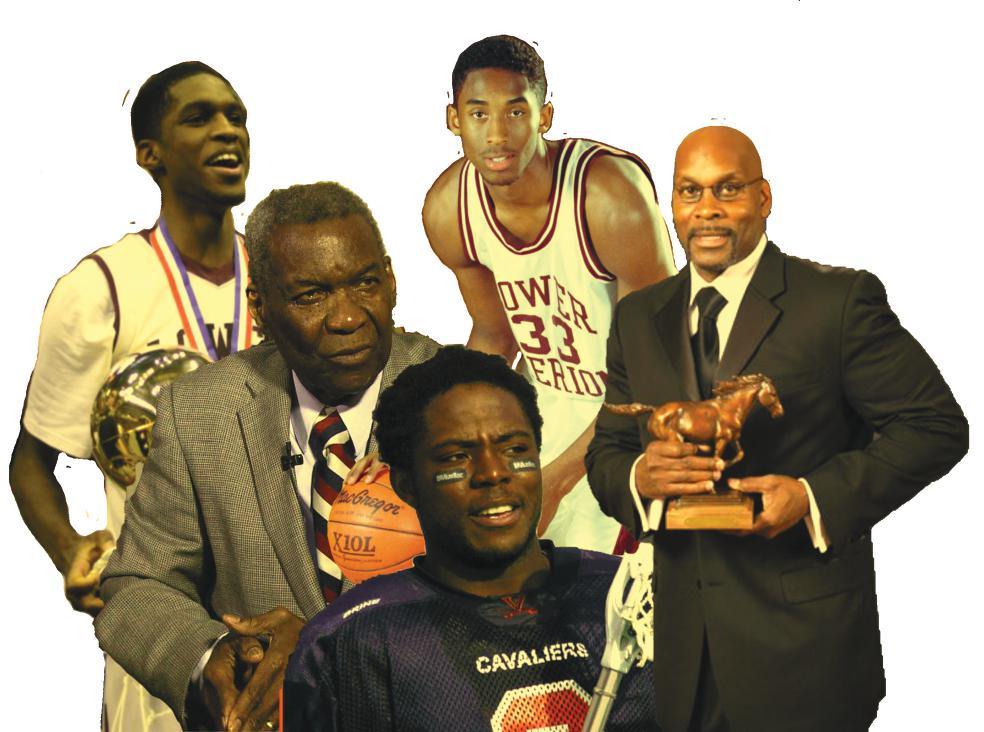
7 minute read
pages
Celebrating Black History Month
Emmi Wu ’23, Shaine Davison ’23, Emma Liu ’22, Spencer Rosenbaum ’22
Advertisement
Pictured from le to right are a few of LM’s most notable Black alumni. In order: B.J. Johnson, Julius W. Becton Jr., Johnny Christmas, Kobe Bryant, and Russell Carter.
In honor of Black History Month, The Merionite is exploring various ways LM highlights diversity and promotes equality. Through programs, classes, and extracurriculars LM is fosters an environment for inclusivity and racial equity. Students of color are o ered an opportunity to join Becton Scholars, an a nity group that helps cultivate academic excellence and leadership. This program provides students with a safe space to engage in conversations, activities, and projects to voice their ideas, di erences, and goals while celebrating their cultural heritage. Entering the 2021-22 school year, the Voices in African American Literature course along with the Black Excellence course joined the school course o erings. Along with academic groups and classes, the student body is also heavily involved in Black culture and activism. Other student-centered activities include the Council for Racial Equity and Inclusivity, Black Student Union, the Diversity Leadership Council and LM’s “Well-read Brothers,” a book club for Black men.
Representation in education
Sulaiman Mathew-Wilson ’23
Black History Month was created in 1970 by Carter G. Woodson as an expansion of what was originally known as Negro History Week. Woodson established Black History Month because he believed that white-dominated history had little interest in Black history and that all Americans should understand the largely overlooked achievements of Black Americans. Before Black History Month, Black history didn’t receive much attention, and even to this day, it isn’t given the same attention that it deserves in our education. Even in our school district, classes such as Black Excellence: The Politics, Economics, & Culture of an American People and Voices in African American American Literature weren’t introduced until very recently. Courses like these are extremely important for both white students and students of color. Not only is it essential for all students to learn about Black achievements and history, but it is also crucial for Black people and students to learn about their history and heritage. While Black History Month is important, it’s just as important that we teach Black history all year long.
In the first semester of the school year, I took the course Black Excellence: The Politics, Economics, and Culture of an American People, and in that short period of time, I learned about more Black history topics than ever before.
Classes like these are examples of ways that schools can incorporate Black history all throughout the school year. Overall, I think Black History Month is important to promote more knowledge and awareness of Black history. However, it’s even more important that learning about Black history is done more than just during Black History Month. Viewing history through the lens of groups of people who've been marginalized, such as but not limited to Black people, is extremely important, so the injustices of the past and present do not repeat.
Q&A with Tyler Goodwin
Teacher for Voices in African American Literature (VAAL) course & Black Student Union sponsor
What does Black History Month mean to you?
Black History Month means a time to highlight the culture and achievements of the descendants of the people who came to the United States due to the African diaspora. What can we do to strengthen diversity & inclusion at LM?
We need to create more opportunities for students and sta to interact and collaborate over a common goal with those who are not like them. How should we celebrate BHM at LM?
Each department should have a Black History Month bulletin board to highlight achievements in their discipline. We also need to implement a larger focus on advisory lessons/discussions. Together, students should be brought together with a school-wide assembly educating students on the importance of Black history. What literature do you read in VAAL?
Their Eyes Were Watching God by Zora Neale Hurston
- Malcolm X
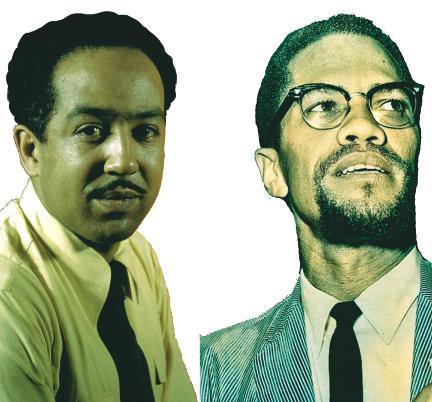
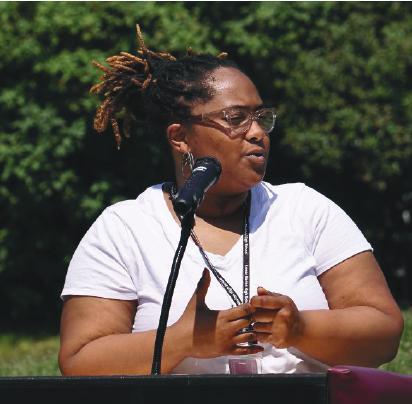

What does Black History Month mean to you?
Anisa Pugh ’22
It may be the shortest month of the calendar year, but in the Black community, we use it as a time to reclaim our culture and celebrate all it means to be truly, unapologetically, Black. Every time February rolls around, many feel the need to talk about the lives and achievements of people such as Martin Luther King Jr. and Rosa Parks. While both of these trailblazers should be celebrated for the strides and risks they took to further civil rights, we’d like to focus on the culture aspect of Blackness this February. Black people have a ected every aspect of culture: clothes, shoes, language, and everything in between. This month, when you walk through the school and take in the culture around you, take a second to think about who built it. As far as celebrating Black History Month within the LM community, many, including myself, feel as if it’s briefly spoken about and then brushed under the rug. To recognize the achievements of the Black community within communities like ours, we should be doing more than talking about it. Community service should be done, and vigils should be held in honor of the people within the Black community whose lives are taken from them every year simply because of the color of their skin. Trauma is unfortunately a part of our culture, but in order to move past it, it must be dealt with. We need more Black people to step up and tell their communities how to accurately celebrate them during Black History Month. Once others are ready to listen and put the words of minorities into action, only then will we be able to thoroughly celebrate our month.
-Kayla Bogui ’23
-Ayanna Easley ’25
-Kendall Law ’22 Of the Pan-African flag, red represents blood that united all people of Black African ancestry, blood shed for liberation.
Spotlighting student voices
Makai Beadle ’22
What does Black History Month mean to you?
I believe we should celebrate BHM by just giving the opportunity for others, who have not experienced what it is to be Black, to gain some perspective. We need to incorporate Black historical figures into all curriculums and assignments and not just the same few that are always talked about. We need to focus on a variety of figures that relate to the subject.
Aniah Bethea ’25
What does Black History Month mean to you?
Black History means to me the celebration of Black culture, leaders, artists, singers, inventors–all Black people who made global contributions or contributions to help shape or build America and the world.
LM’s favorite role models
Aniah Bethea ’25 Mary Beatrice Kenner was a Black female inventor who made improvements to the sanitary belt, which paved the way of menstrual pads for women.
Green represents the vegetation of Ethiopia, the promised land.
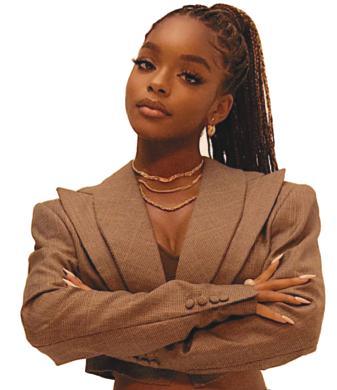
- Marsai Martin Tyler Goodwin I would like to highlight the "Divine Nine" fraternities and sororities that are established across the United States for Black people.
Alpha Phi Alpha
Alpha Kappa Alpha
Kappa Alpha Psi
Omega Psi Phi
Delta Sigma Theta Phi Beta Sigma Zeta Phi Beta Sigma Gamma Rho Iota Phi Beta
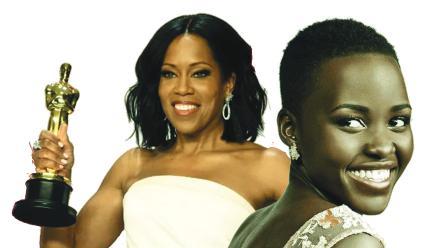
There are nine historically Black Greek letter organizations (BGLOs) that make up the National Pan-Hellenic Council. Collectively, these organizations are referred to as the “Divine Nine." Each of these fraternities and sororities is rich in history–ties to one or more of these organizations may be found in many college-educated Black families in the United States.
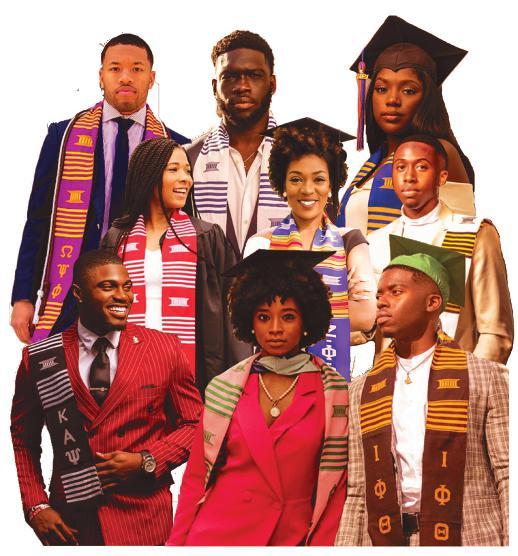
Riley Reece ’22 Regina King or Lupita N'yongo, because they are both amazing actresses and are great at portraying emotions on screen.






